Workpackages
WP1 – Application Concept Design and Business Development
WP1 defines and manages the two target applications, heart failure and coronary heart disease and guarantees that all application aspects are based on clinical excellence and the medical expert knowledge. This is not a technical WP, but it will collect the expert knowledge and make it accessible for developing the technical solutions in the areas of application design, medical expertise, business expertise and technology interface. WP1 will be a Work Package throughout the course of the whole project with different strategic tasks in the progression of the project work.
| WP2 – Sensors and Parameter Extraction |
|
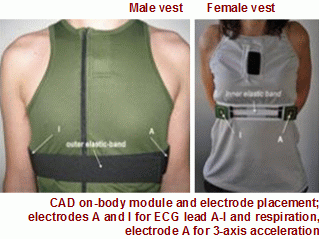
|
The Sensors and Parameter Extraction Work Package will provide the hardware and software that will be used for sensing and extracting the features for the patient and professional loops, addressing the requirements from the application (WP1). The Work Package will provide sensors for physiological signals, for ambient and context awareness, for biochemical markers as well as stationary sensing devices. Physiological signals will be measured using textile and wearable sensors, based on My-Heart and other EU projects outcome and experience. The Work Package will also provide new sensing technology for very important parameters such as blood pressure, oximetry, non-contact electrocardiogram and mechanic heart function, advanced artefact removal, pulmonary arterial pressure (PAP). Some of the developed sensors will be prototyped for the validation, while advanced research will be pursued for more challenging sensors, in parallel to the validation. |
| WP3 – Multi-parametric Analysis and Decision Support |
|
| WP3 develops the models to derive medication and lifestyle effectiveness and a compliance indicator from the multitude of vital parameters measured, including the context information, which in combination reflect the current patient health status. The appropriate choice of parameters as well as their combination for the purpose of the effectiveness analysis will be carried out within this Work Package, which will also derive the conclusions/decision support from the parameter analysis, for use in the patient closed-loop system and in the professional system. | 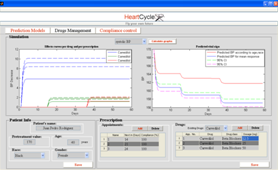 |
| WP4 – Patient Loop |
|
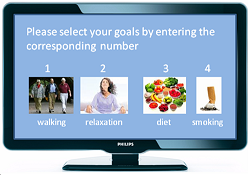
|
This Work Package models, designs and develops the patient platform, which will provide the user with a system to self-manage their health status and to educate them to adopt a healthy lifestyle. The system will be personalised for real users, adjusting the protocols to their personal daily routine according to their capabilities and needs. Furthermore, motivation will play a crucial role for addressing the compliance. The patient platform will enable the integration among all actors and modules of the complete architecture, gathering all information from the sensors, monitor the health status, provide feedback to the patient and enable the communication with the professional platform. |
WP5 – Professional Loop
WP5 develops a scalable open standard technological platform, i.e. the “e-ICCM “(Innovative Chronic Condition Management), which enables the implementation and time to market deployment of remote management services (such as the ones defined and specified in WP1), developing standard based interfaces with electronic medical records. WP5 provides the technological means that enable integration of the HeartCycle system inside existing healthcare systems, by facilitating the tools for personalized management of chronic diseases and risk conditions.WP6 – Validation
This Work Package aims to prove the effectiveness of the solution offered by HeartCycle in improving the adherence of patients to lifestyle and medication recommendations and the benefit that the improved adherence has on the course of the disease, exemplarily for CHF and/or CHD. This includes an identification of the relevant parameters both for assessing lifestyle, compliance factors and for assessing the health status of the patients. It also includes usability tests on single modules and novel components as well as for the whole system. Validation will be a Work Package throughout the course of the whole project with different focal points in the progression of the project work. The last phase of the project will consist of a large validation study to provide the clinical evidence to the benefits of the platform in disease management and in adherence outcome.
| WP7 – Knowledge Management |
|
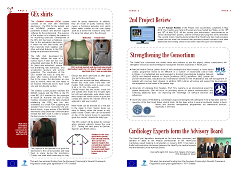
|
WP7 will account for the management of all knowledge related to the project in all aspects, including providing visibility of the project to the public. This concerns the management of knowledge going into the project, created within the project, as well as going out of the project. The subjects that will be dealt with are the Dissemination of project results and project knowledge, the management and planning of Exploitation of project knowledge and results, the contribution to Standardisation in the field and the protection of the Intellectual Property. |
WP8 – Project Management
The WP on Project Management deals with the coordination and management of the project and the consortium as a whole in all aspects and comprises the implementation of the management processes. WP8 is in charge of the overall coordination of the Work Packages, including overall technical progress monitoring and quality assurance. Moreover, WP8 is responsible for the management of communication between all stakeholders, amongst others for the communication with the European Commission.
WP9 – Socio-economic monitoring and concertation activities
WP9 will support the business development process through analyses of the clinical and organizational outcomes from an economic perspective, i.e. assessment of the socio-economic impact of the application to individual stakeholders and to society at large. WP9 will be closely related to WP1 and WP6.
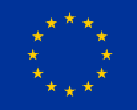 |
 |
The work leading to these results has received funding from the European Community's Seventh Framework Programme under grant agreement n° FP7-216695 |
